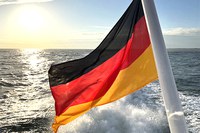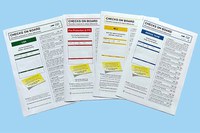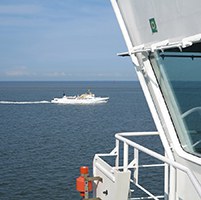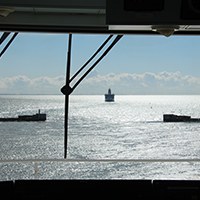News 2024
As part of the fee reform that entered into force on 1 October 2024, the fees of the Federal Maritime and Hydrographic Agency BSH were integrated into the Special ordinance on fees of the transport ministry (Besondere Gebürenverordnung des BMDV, BMDV-WS-BesGebV). It now contains both the fees of the BSH in section 4 of the annex as well as the fees of the Ship Safety Division of the BG Verkehr in section 5 of the annex. Some of the fees of the BSH have been changed during this transition. The former Ordinance of fees of the BSH (BSH-Gebührenverordnung) remains valid for "older cases" and is planned to be revoked.
We will shortly update our Fees Calculator and the respective details of the fees on our website.
From 1 September to 30 November port state control officers will take a close look at employment agreements and correct payment of wages. With their "Concentrated Inspection Campaign (CIC)" the Tokyo and Paris Agreements on Port State Control verify whether the provisions of the Maritime Labour Convention are being complied with.
In the course of the current concentrated inspection campaign, which started on 1 September, port state control officers (PSCO) of the Paris and Tokyo MoUs have been checking sea-going vessels and their crew with extra attention on compliance with the requirements for employment agreements and regular payment of wages. In addition, the surveyors verify if the required financial security for repatriation of seafarers is provided.
In Germany, the Ship Safety Division of the BG Verkehr is responsible for port state control. The PSCOs of the Ship Safety Division, who all worked at sea themselves before joining the authority, have all been specially trained for the CIC. During the CIC inspections, the PSCOs use questionnaires that were developed for this very purpose.
If the officers find that a ship does not comply with all the relevant provisions, the shipowner will have to rectify the deficiencies within a given period of time. Serious or an excessive number of deficiencies may lead to the ship being detained. The secretariat of the Paris and Tokyo agreements on port state control publish any detention of a ship on their website parismou.org und www.tokyo-mou.org.
A new Concentrated Inspection Campaign takes place every year between September and November and are carried out within a regular port state control inspection.
Further information on the joint concentrated inspection campaign of Paris and Tokyo MoU as well as the questionnaire are provided in the joint press release.
Since April 2024, possession of up to 25 grams of cannabis for personal use is permitted according to the German Cannabis Act. Recently, the legislator stipulated a concrete cannabis limit for road traffic. But what is allowed at sea?
 First things first: Even though a small amount of cannabis for personal use has been legalized, the legal status for maritime shipping has not changed. Just like before a cannabis limit of 1.0 ng/ml THC (Tetrahydrocannabinol) in the blood serum applies on German maritime waterways. Although this value is planned to be aligned with the recently increased limit of 3.5 ng/ml THC for road traffic, even that value is quickly reached, because it is comparable to a blood alcohol concentration of 0.2 per mill driving limit.
First things first: Even though a small amount of cannabis for personal use has been legalized, the legal status for maritime shipping has not changed. Just like before a cannabis limit of 1.0 ng/ml THC (Tetrahydrocannabinol) in the blood serum applies on German maritime waterways. Although this value is planned to be aligned with the recently increased limit of 3.5 ng/ml THC for road traffic, even that value is quickly reached, because it is comparable to a blood alcohol concentration of 0.2 per mill driving limit.
Oftentimes, cannabis consumption leads to being limited in one's work on board or being unable to safely command and navigate the ship. The consequences may be a monetary fine as well as the revocation of the certificate of competency or the medical fitness certificate. The reason for these penalties is that regular cannabis consumption leads directly to lower performance in awareness, attention and one's capacity to react. In addition, significant side effects may occur – including sedation, drowsiness, diarrhoea, nausea, vomiting or fever. There is a difference whether one consumes cannabis in a private setting (if legally or illegally is not relevant) or in a professional capacity on board a sea-going vessel, where an emergency or rescue situation that requires a minimum degree of capability may occur at any time.
However that is not all: Cannabis consumptions effects everybody differently. The THC concentration in the blood strongly depends on individual factors such as: How often and how much cannabis gets consumed? How high is the general performance and how does the body react to cannabis consumption? How used to cannabis is the person already? According to a verdict of the Federal Constitutional Court, the cannabis consumer, as the cause of the risk, bears the "residual insecurity" of the individually occurring THC effects. The protection of the general public exceeds the individual right for intoxication, states the highest German court.
The BG Verkehr recommends to their member companies to fully ban bringing any cannabis products to work as well as the consumption during work hours or breaks. The BG Verkehr includes this in the measures that facilitate an effective prevention of occupational accidents for all employees.
For more information on the topic refer to our website in our section "Maritime Medicine".
The first issue of "PSC Awareness" has arrived! In the future, the newsletter will be published several times throughout the year offering you an overview of the current Paris MoU performance of German-flagged ships, of the Paris MoU news and of specific remarkable deficiencies that were found during port state control inspections over the last few weeks.
The newsletter will also cover practical tips for up-coming PSC inspections for shipowners and crew. In each issue one particular aspect having shown an increased number of irregularities in the recent past will be the focus.
In addition to the prevention service "Checks on Board", the concise newsletter "PSC Awareness" supports shipowners in optimizing the performance of their ships. For strong maritime shipping under German Flag.
The German Flag has stepped up significantly in the ranking of the Flag States in comparison to last year. It is now No. 21 on the White List of the Paris Memorandum of Understanding on Port State Control (Paris MoU), which goes to shows that the German Flag continues to be a flag of high quality.
 Last year the German Flag placed 34 in the Flag State Ranking of the Paris Memorandum of Understanding on Port State Control (Paris MoU), now it managed a jump to 21. This is based on the recently published White-Grey-Black List of the Paris MoU, which is valid from 1st July.
Last year the German Flag placed 34 in the Flag State Ranking of the Paris Memorandum of Understanding on Port State Control (Paris MoU), now it managed a jump to 21. This is based on the recently published White-Grey-Black List of the Paris MoU, which is valid from 1st July.
The reason for the improvement of the German Flag in the ranking is less detentions of German-flagged ships at port state control inspections throughout the last year. This puts the German Flag in this year's ranking ahead of the flags that are most chosen by German shipowners: Portugal (this year: 22, last year: 26), Liberia (this year: 30, last year: 25) and Antigua/Barbuda (this year: 35, last year: 31).
As in the previous year, Denmark came first in the Paris MoU ranking. The Netherlands came second (last year: 4) and Norway third (last year: 5). The world's largest flag, Panama, is on place 55 (last year: 46) and therefore in the Grey List of the Paris MoU. Just like the previous year, of all the flag states covered Cameroon comes last in the ranking on place 71.
The White-Grey-Black List of Paris MoU is based on the total number of inspections and detentions of flags with at least 30 inspections during a three-year period. The ranking is published every year and among other things, it determines how often ships will get inspected in port state controls.
With its latest service offer "Checks on Board", the German Flag supports shipping companies in preparing their ships for port state control inspections abroad. The goal is a better performance during unannounced surveys by offering these checklists that are in step with actual practice.
 The Ship Safety Division of the BG Verkehr offers shipping companies with German-flagged sea-going ships a practical preparation for PSC inspections abroad with its new service "Checks on Board". These checklists are aimed at improving the performance of individual ships and their respective company-fleet as well as preventing the detection of deficiencies during PSC inspections.
The Ship Safety Division of the BG Verkehr offers shipping companies with German-flagged sea-going ships a practical preparation for PSC inspections abroad with its new service "Checks on Board". These checklists are aimed at improving the performance of individual ships and their respective company-fleet as well as preventing the detection of deficiencies during PSC inspections.
"Checks on Board" is a new service of the German Flag and comes without any obligations; the internal results of the checklists remain with the shipping company. The checklists are meant for both the management on board as well as onshore company-inspectors since ship-side and land-side operations should be closely integrated with each other according to the core idea of the ISM Code.
The different editions of "Checks on Board" are always structured in the same way: The first part contains a checklist about the respective topic, the second part contains explanations and legal bases. In terms of content, the "Checks on Board" cover every part of a ship's operations from ship safety over marine environment protection to working and living conditions of seafarers.
Currently the following editions of "Checks on Board" are available at https://www.deutsche-flagge.de/en/german-flag/support-for-shipowners:
- Bridge Team: Navigational Bridge – Bridge Team Management
- MLC: Maritime Labour Convention - Maritime Labour Act
- Fire protection & FFE: Fire Protection, Alarm System & Fire-Fighting Equipment
- LSA: Life-Saving Appliances / GMDSS / Abandoning Ship
More "Checks on Board" will follow.
From 27 to 29 May in Dresden, the International Social Security Association (ISSA) hosts a symposium on how migration and occupational health and safety interact. The symposium takes place in person as well as online, all presentations are translated simultaneously into German and English. One presentation focusses on cultural differences on board a seagoing ship.
Topics of the symposium include difficulties in communication when working together, integration of foreign employees or recruiting from abroad. Good practice examples add to the program. Presentation and discussion groups about experiences from 15 different nations offer deepened insights into the challenges and chances of cultural diversity at the work place.
On 28th May, associate professor Dr. Marcus Oldenburg of the Central Institute for occupational and maritime medicine in Hamburg will give a talk about "Cultural differences in seafarers' perception of stress and the particular challenges of training ship officers".
The organizers of the symposium are the sections Prevention in Transportation and Prevention in Health Care Services of the International Social Security Association (ISSA). The participation at the conference is possible online and in person. The presentations will be translated simultaneously into German and English.
The program and further information on the symposium is provided on the website of ISSA.

The Stiftung "Schifffahrtsstandort Deutschland" has been funding navigational and engineering vocational training as well as professional development of seafarers for over ten years. This purposeful subsidisation supports the endeavours of companies with regard to professional training and development of their maritime specialized personnel in Germany.
After the foundation had already raised their funding sums for vocational training last year, this year it increases the funding sums for professional development. For the subsidisation year 2024, the foundation increases the maximum amount to be subsidised both per eligible person as well as per professional development measure by 600 € each – to 3,600 € and 4,600 €. In addition, the maximum funding for training outside the training location ship is also raised by 600 € to 3,200 €.
The funding amounts for navigational and engineering vocational training and the compensation amounts for changing to a foreign flag acc. to sec. 7 para. 3 of the German "Flaggenrechtsgesetz" remain the same.
Applications for the various funding measures in 2024 can be submitted as of now and must have arrived at the foundation at the latest on 28 February 2025 at 6 pm. Further information regarding the funding and the application forms is given under the heading "Financial Matters" as well as on the website of the Stiftung "Schifffahrtsstandort Deutschland".
As of this year, maritime shipping is included in the EU Emission Trading System. Now the "Bundesumweltamt" (UBA) announces that the German implementation of the EU requirements is delayed. It is anticipated that German shipping companies will be able to join in the trade of emission certificates by April.
The EU has made it mandatory for shipping companies with ships of 5,000 GT and more that call on EU ports to buy certificates for greenhouse gas emissions. This European emission trade comprises any maritime traffic between EU ports as well as between an EU port and a third state port (for the latter only half the amount is paid).
The obligation for shipping companies to acquire emission trading certificates is phased in. This year, the shipping companies concerned have to buy certificates for 40% of their actual emissions, next year it's for 70% and from 2026 for all greenhouse gas emissions. The proceeds from this certificate trading feed into the climate innovation fonds of the EU, which, in part, finances measures to improve climate protection in the European maritime traffic sector.
Germany has not yet implemented the EU requirements for the inclusion of maritime shipping into the European emission trade in its national legislation. The German Emissions Trading Authority (DEHSt) of the Federal Environment Agency (UBA), which is the responsible authority for the ETS in Germany, has recently announced that the Federal Ministry for Economic Affairs and Climate Action is soon to produce the amendment of the German Greenhouse Gas Emission Trading Act (Treibhausgas-Emissionshandelsgesetz). According to information provided by the DEHSt, German shipping companies will only be able to open maritime operator holding accounts from April 2024. The maritime operator holding accounts are required in order to register the emission certificates in the Union Registry. The DEHSt stresses that the shipping companies concerned will not be negatively affected by this delay in German implementation of the EU requirements.
The due date for shipping companies to submit the certificates of the greenhouse gases emitted in 2024 is 30th September 2025. Which German shipping companies are obliged to buy emission certificates is given in the appendix to the Implementing Regulation (EU) 2024/411 of 30th January 2024 listed under "Germany" (page 6 of 14).
Over the next days and weeks, the German Maritime Centre (Deutsches Maritimes Zentrum) offers several information events regarding the European Maritime Emission Trade. You can find the individual dates of the "Maritime Trends" events in our Maritime Calendar.
The website of the DEHSt contains further information on the practical implementation of the EU maritime emission trading in their Q/A catalogue among other places. You can reach the customer service of the DEHSt via the following e-mail: emissionshandel@dehst.de
For further questions on the topic, you are welcome to contact the Ship Safety Division of BG Verkehr: Phone: +49 40 36 137 217, E-Mail: maschine@bg-verkehr.de.
As of now, shipping companies can calculate what the fees are to enter a sea-going ship into a German shipping register with our new tool Fees Calculator Ship Registration. Meanwhile, the trend towards a centralized German shipping register continues. The Federal State Rheinland-Pfalz has transferred their two shipping registers to Hamburg by interstate agreement.
 Sea-going ships from a hull length of 15 m and more belonging to German owners have to be entered in a German shipping register for sea-going ships – irrespective of the flag the ships are flying. This is regulated under §1 of the German “Flaggenrechtsgesetz” (flag act) in conjunction with §10 para. 1 of the "Schiffsregisterordnung" (shipping register ordinance).
Sea-going ships from a hull length of 15 m and more belonging to German owners have to be entered in a German shipping register for sea-going ships – irrespective of the flag the ships are flying. This is regulated under §1 of the German “Flaggenrechtsgesetz” (flag act) in conjunction with §10 para. 1 of the "Schiffsregisterordnung" (shipping register ordinance).
The charged fees for the registration in a German shipping register for sea-going ships depend on the value of the ship. In most cases, the value of the ship is given in the sales contract.
With our new Fees Calculator Ship Registration, ship operators can now calculate how high the fees for initial registration would be. Simply enter the value of the sea-going ship into the dedicated field and click once – just like that, the registration fee is displayed.
 Usually, there are no fees when changing to the German Flag, because ship's of German owners that had previously been flying a foreign flag and were therefore flagged-out are already registered in a German shipping register for sea-going ships. For fees regarding changing to the German Flag and newbuildings under German Flag, please use our separate Fees Calculator German Flag.
Usually, there are no fees when changing to the German Flag, because ship's of German owners that had previously been flying a foreign flag and were therefore flagged-out are already registered in a German shipping register for sea-going ships. For fees regarding changing to the German Flag and newbuildings under German Flag, please use our separate Fees Calculator German Flag.
In the meantime, the centralization trend of the previously 17 German shipping registers for sea-going ships is continuing. In 2021, the Federal States Berlin and Brandenburg transferred their shipping registers to the shipping register of Hamburg by interstate agreement. This was followed by Bavaria, Baden-Württemberg and parts of Hessen in 2023. As of 1st February Rheinland-Pfalz has transferred about 200 sea-going and 650 inland ships of the shipping registers Mainz and St. Goar to Hamburg. The shipping register of Hamburg with over 8,000 sea-going and inland ships has been working digitally since 2020.
MARPOL Regulation V/10.3 applies as of May 2024 for ships from 100 GT
Ships of a certain size navigating within the jurisdiction of MARPOL parties have to maintain a garbage record book. So far this obligation began from 400 GT. This is about to change: As of 1st May 2024, the garbage record book is mandatory from a ship size of 100 GT.
According to MARPOL Regulation V/10.3, the garbage record book is still mandatory for all ships on international voyages approved for 15 or more persons (passengers and crew) irrespective of their ship size. And it is also mandatory for fixed or floating platforms (FFPOs).
Information on the contents required in the garbage record book can be found in ISM Circular 02/2018 – "New Form of garbage record books from 01 March 2018".
Garbage record books as paper hard copies are available in all known shops selling ship's logbooks and record books. Here on the website, you can also find a list of approved electronic (garbage) record books approved by the German Flag.
On 15th February 2024, the new guideline for approved practical training and sea-going service for electro-technical rating aspirants (ESA) entered into force. According to the guideline, sea-going service as ESA has to be served in compliance with it and recognized as practical time at sea.
In Article III the ESA guideline requires that every ESA has to maintain a traning record book. This record book is published by the Federal Maritime and Hydrographic Agency (BSH) and is available commercially with the ISBN: 978-3-96490-214-6.
Read more on training record books.
It is not yet possible to receive Maritime Safety Information (MSI) via the recognized mobile satellite service Iridium, which has been recognized by IMO since 2018. Therefore, the German Flag recommends not to rely exclusively on Iridium systems in Sea Area A3. However, distress calls can be made globally via Iridium without any problems.
For more safety at sea, the ship commands of sea-going ships covered by the SOLAS Convention are obliged to be able to transmit and receive distress calls as well as Maritime Safety Information (MSI) in the sea areas they are navigating at any time. MSI – i.e. navigational, meteorological and other safety-related information – is part of the Global Maritime Distress and Safety System (GMDSS), which has its basis in the SOLAS Convention.
In the Iridium GMDSS service of the US provider Iridium Satellite LLC, which has been recognized by IMO since 2018, distress calls can be transmitted and received globally without any limitations. However, reception of MSI via the Enhanced Group Call (EGC) of the Iridium SafetyCast Service is not yet completely possible in all sea areas. In some NAVAREASs and METAREAs (= established area for broadcasting navigational and meteorological information and warnings) Iridium is not yet operational or is in trial operation. The current status can be found on the website of the International Hydrographic Organization.
Due to the current network covering issues, shipping companies should not rely solely on Iridium systems at present. Therefore, the German Flag recommends to shipping companies with sea-going vessels navigating sea area A3 to still provide an Inmarsat EGC system (Ship Earth Station, SES) – for example as backup arrangements. Only this way can the reception of MSI via the mandatory Enhanced Group Call (EGC) be guaranteed at any time.
In our section "People of the German Flag", we introduce to you persons from the maritime industry who bear relation to the German Flag. This time in our portrait: Christoph Gessner, Chief Operating Officer of Offen Group.
Christoph Gessner grew up on the North Sea island Föhr – accompanied by his father's experiences as a radio operator working at sea. So it is not surprising that his interest in seafaring was awakened early on.
In 1994, Christoph Gessner began his career as a ship's mechanic apprentice at the shipping company Hamburg Süd followed by studying in Hamburg and seagoing service as both navigational and engineering officer. In 2003 he became superintendent at the Hamburg Süd subsidiary company Columbus Shipmanagement and became its CEO in 2014. Since December 2018, he is Chief Operating Officer of the Offen Group.
Read about Christoph Gessner and find out what he finds so intriguing about shipping and seafaring, what his relationship is with the German Flag and how he judges the strengths and the future of the German Flag in our current portrait "People of the German Flag".

